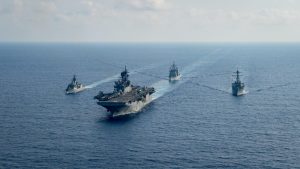The Malaysia-Vietnam Joint Submission and Vietnam’s Partial Submission on May 6 and 7, 2009, respectively, to the UN Commission on the Limits of the Continental Shelf (CLCS) started the first legal battle in the South China Sea (if you will, the diplomatic note exchange 1.0). Twelve notes in all were exchanged from 2009 to 2011 (three from China, two from Malaysia, three from the Philippines, three from Vietnam, and one from Indonesia). China reacted with its first official publication of the nine-dash line map under the United Nations framework in May 2009, then with the Scarborough Shoal standoff in 2012, and finally the land reclamation of several occupied low tide elevations in the Spratly Island group in 2014. Under Chinese pressure, the South China Sea dispute was eliminated from the Statement of the ASEAN Summit in 2012. China’s actions showed that it had almost no rivals in the field.
However, Chinese intimidation and the diplomatic note exchange 1.0 precipitated the Philippines’ initiation of an arbitration procedure, provided in the Annex VII of the United Nations Convention for the Law of the Sea (UNCLOS), against China in 2013. The arbitral award of 2016 held in favor of the Philippines, but the archipelagic state’s ambivalent attitude under a new president and China’s assertive rejection together threatened to nullify the award.
A new partial submission on an extended continental shelf by Malaysia in December 2019 became a turning point in the legal battle of the South China Sea. The diplomatic note exchange 2.0 (as opposed to the first round from 2009 to 2011) was comprehensive, with wide participation from other impacted states, including countries outside of the region. In eight months, from December 2019 to July 2020, 15 notes verbales, two diplomatic letters (addressed to the UN secretary general), and one statement were exchanged. From the claimants, there were one statement from Brunei’s Foreign Ministry; five notes and one letter from China; two notes from Malaysia; two notes from the Philippines; and three notes from Vietnam. Non-claimants also chimed in, with one note from Australia, two notes from Indonesia, and one diplomatic letter from the United States.
U.S. Secretary of State Mike Pompeo also strengthened the U.S. position on maritime claims in the South China Sea in a strong press statement on July 13. His statement caused a series of declarations from U.S. allies rejecting China’s maritime claims in the South China as legally baseless. The stance of nearly all countries in and outside of the region aligned with the 2016 arbitral tribunal’s decisions.
Now, any maritime claim inconsistent with UNCLOS, is unacceptable, including the nine dash line and any other “historic rights” claim. In line with the 2016 aware, the high tide features in the Spratly Islands cannot generate maritime entitlements wider than 12 nautical miles. Any submerged feature or low tide elevation in the South China Sea cannot be legitimately claimed as territory, and thus the basis for maritime rights. Drawing an archipelagic straight baseline for any group or single unit in the Spratly Islands is also rejected. Any land building activities or other forms of artificial transformation cannot change the natural legal status of a feature under UNCLOS. As a result, any maritime rights generated from the mainland of coastal states — such as those overlapping with Vanguard Bank (off Vietnam), Luconia Shoals (off Malaysia), Brunei’s EEZ, and Natuna Besar (off Indonesia) — cannot be contested areas.
The main thrust of these notes is that no party can modify or negotiate the Tribunal Award, which is deemed to be final and not subject to appeal. The United States called Chinese maritime claims entirely unlawful. Australia refused to accept China’s assertion that its sovereign claims over the Paracel and the Spratly Islands are “widely recognized by the international community.” Malaysia drove a nail into the coffin of the nine dash line claim by stating that China’s claim to the maritime features in the South China Sea has no basis under international law.
The diplomatic note exchange 2.0 has significant implications in that it has encouraged claimant states to clearly demonstrate their stance on UNCLOS’s application, the limits of maritime claims, compliance with the 2016 tribunal award, and a possible acceptable final solution. This development divides the claimant states into distinct groups having opposite positions. While most states – whether claimant or non-claimant — take UNCLOS as the sole legal basis for defining and resolving maritime claims, China continues to mix the historic right claim with full maritime entitlement for features in the South China Sea.
China’s position on South China Sea issues is becoming increasingly isolated. Deep concern over “land reclamation,” “recent developments,” and “serious incidents” in the region was expressed in the Chairman’s Statement of the 36th ASEAN Summit on June 26, 2020. Beijing’s “wolf-warrior diplomacy” regarding its neighbor states may be counterproductive because of its excessive aggression. Any unilateral fishing ban or “Blue Sea” project punishment measures in the common South China Sea will be unacceptable to other parties. Coastal states are more aware of the need to express clearly their dissatisfaction with China’s aggressive behaviors instead of keeping silent for the sake of a fragile peace. The Philippines has stated that the Tribunal Award is non-negotiable. Even Malaysia abandoned its traditional “silent diplomacy” to reject China’s maritime claims in the South China Sea, including maritime and sovereignty issues not yet ruled on in international law. Malaysia’s note thus goes further than the tribunal’s conclusions.
The diplomatic note exchange 2.0 revived the enduring significance of the 2016 tribunal award. The rule-based order in the South China Sea will be maintained when the ruling is compiled with fully by both parties, the Philippines and China, and international law, including UNCLOS is completely respected by all states. Then all countries, inside and outside of the region, can enjoy the benefits of having the South China Sea as a sea of peace, stability, and prosperity.
Nguyen Hong Thao is professor of the Diplomatic Academy of Vietnam.

































